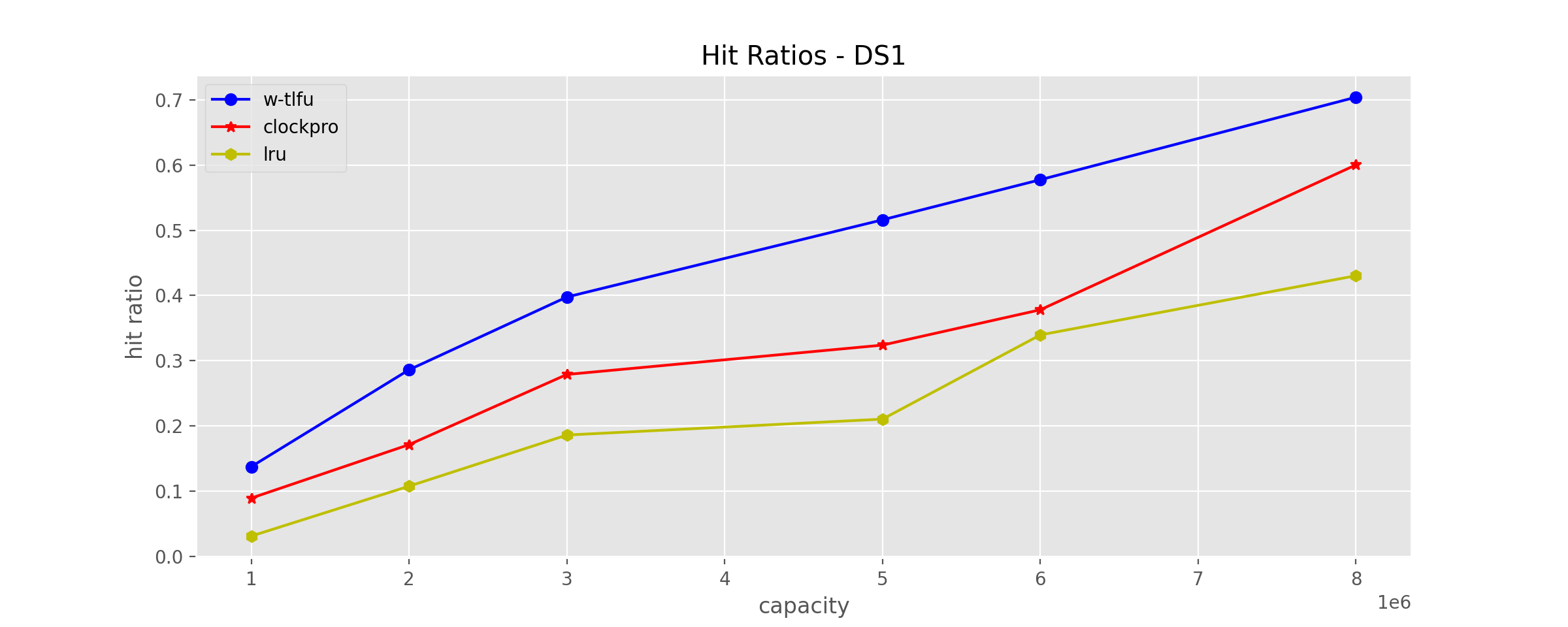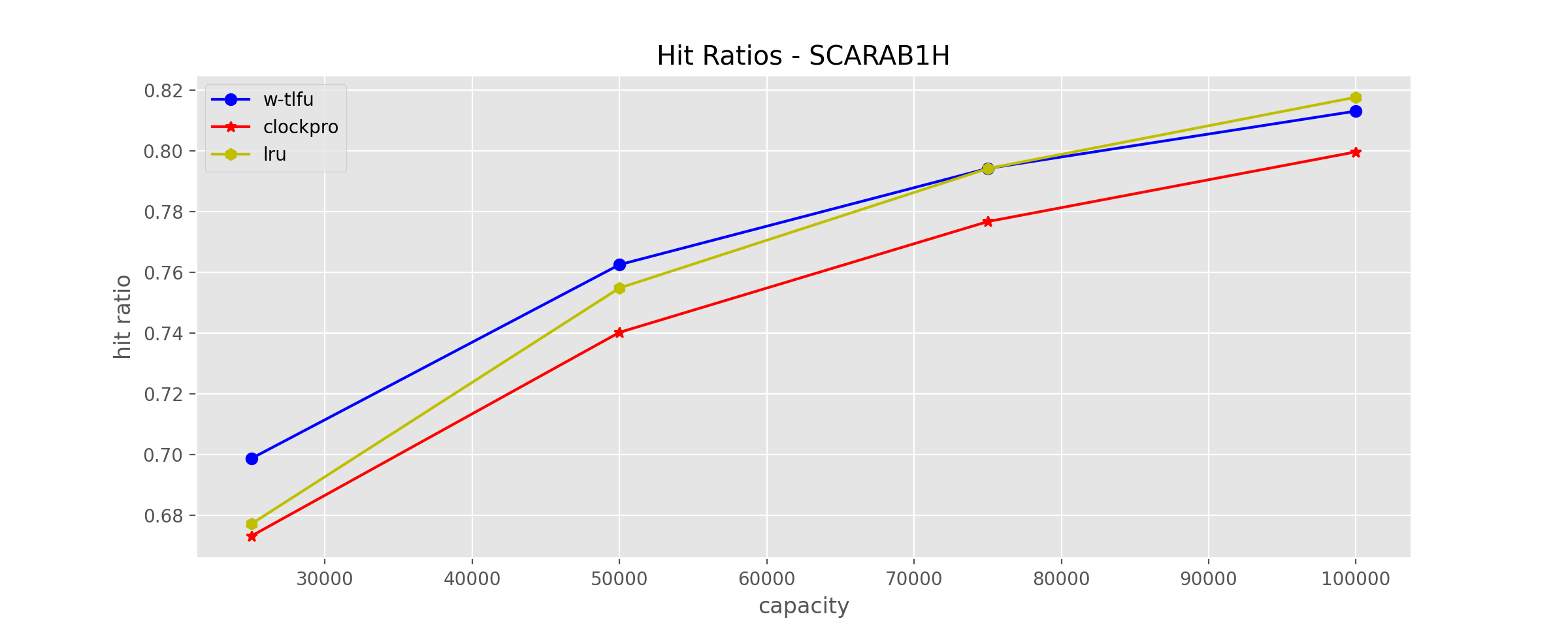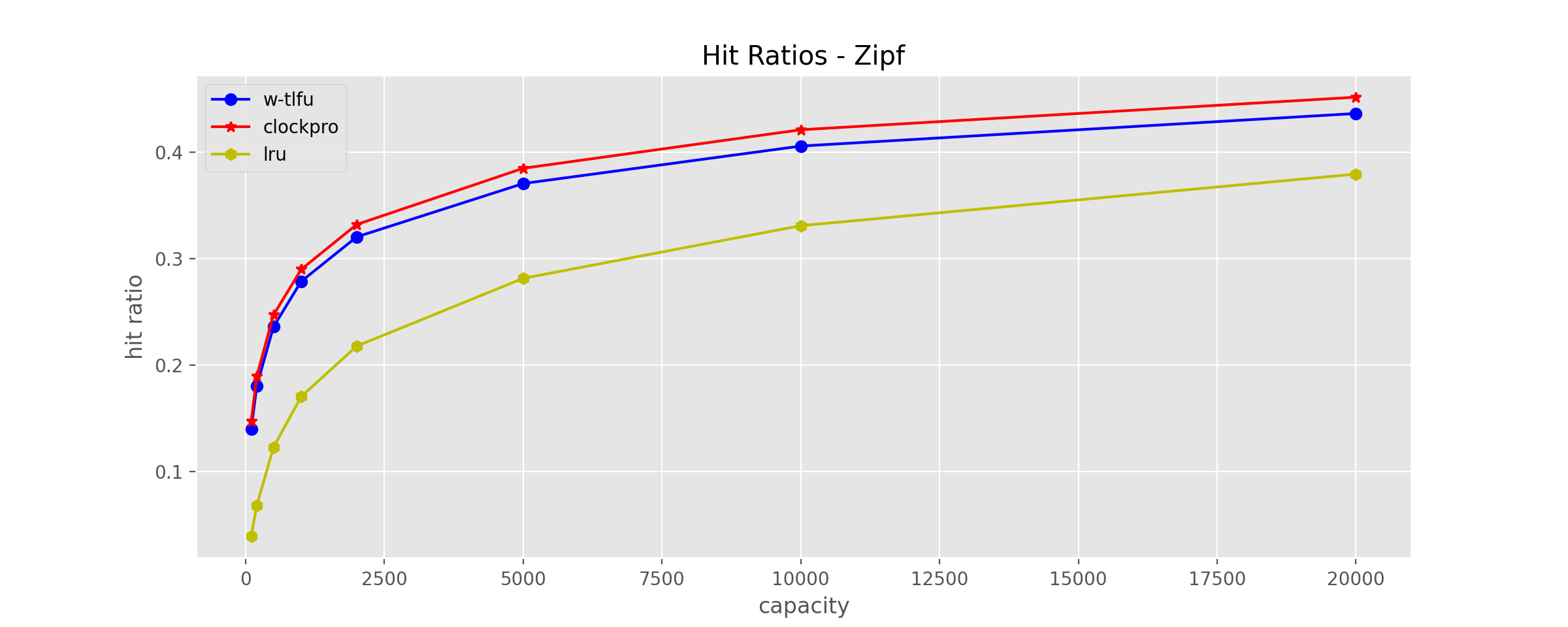Theine
High performance in-memory cache inspired by Caffeine.
-
High performance Rust core
-
Expired data are removed automatically using hierarchical timer wheel
TTL must be considered in in-memory caching because it limits the effective (unexpired) working set size. Efficiently removing expired objects from cache needs to be prioritized over cache eviction. - A large scale analysis of hundreds of in-memory cache clusters at Twitter
-
Simple API
-
Django cache backend
Table of Contents
- Requirements
- Installation
- Cache Eviction Policies
- API
- Decorator
- Django Cache Backend
- Metadata Memory Overhead
- Benchmarks
- Support
Requirements
Python 3.7+
Installation
pip install theine
Cache Eviction Policies
Theine provides 3 built in cache eviction policies:
LRU
Discards the least recently used items first.
W-TinyLFU
An approximate LFU policy in order to boost the effectiveness of caches subject to skewed access distributions.
Theine uses an adaptive version of W-TinyLFU to get better hit ratio under different types of workloads.
Reference:
https://arxiv.org/pdf/1512.00727.pdf
Clock-PRO
An improved CLOCK replacement policy(CLOCK: an approximation of LRU), based on PyClockPro.
Reference:
https://static.usenix.org/event/usenix05/tech/general/full_papers/jiang/jiang_html/html.html
API
Key should be a Hashable object, and value can be any Python object. If key type is not str/int, Theine will generate a unique key string automatically, this unique str will use extra space in memory and increase get/set/remove overhead.
Please be aware the Cache class is not thread-safe.
from theine import Cache
from datetime import timedelta
# tlfu is the eviction policy, Theine provide 3 policies lru/tlfu/clockpro
cache = Cache("tlfu", 10000)
# without default, return None on miss
v = cache.get("key")
# with default, return default on miss
sentinel = object()
v = cache.get("key", sentinel)
# set with ttl
cache.set("key", {"foo": "bar"}, timedelta(seconds=100))
# delete from cache
cache.delete("key")Decorator
Theine support hashable keys, so to use a decorator, a function to convert input signatures to hashable is necessary. The recommended way is specifying the function explicitly, this is approach 1, Theine also support generating key automatically, this is approach 2. Same as Theine API, if key function return type is not str/int, Theine will generate a unique key string automatically, this unique str will use extra space in memory and increase get/set/remove overhead.
- explicit key function
from theine import Cache, Memoize
from datetime import timedelta
@Memoize(Cache("tlfu", 10000), timedelta(seconds=100))
def foo(a:int) -> int:
return a
@foo.key
def _(a:int) -> str:
return f"a:{a}"
foo(1)
# asyncio
@Memoize(Cache("tlfu", 10000), timedelta(seconds=100))
async def foo_a(a:int) -> int:
return a
@foo_a.key
def _(a:int) -> str:
return f"a:{a}"
await foo_a(1)Pros
- Both sync and async support.
- Explicitly control how key is generated. Most remote cache(redis, memcached...) only allow string keys, return a string in key function make it easier when you want to use remote cache later.
- Thundering herd protection(multithreading: set
lock=TrueinMemoize, asyncio: always enabled). - Type checked. Mypy can check key function to make sure it has same input signature as original function and return a hashable.
Cons
- You have to use 2 functions.
- Performance. Theine API: around 8ms/10k requests ->> decorator: around 12ms/10k requests.
- auto key function
from theine import Cache, Memoize
from datetime import timedelta
@Memoize(Cache("tlfu", 10000), timedelta(seconds=100), typed=True)
def foo(a:int) -> int:
return a
foo(1)
# asyncio
@Memoize(Cache("tlfu", 10000), timedelta(seconds=100), typed=True)
async def foo_a(a:int) -> int:
return a
await foo_a(1)Pros
- Same as explicit key version.
- No extra key function.
Cons
- Worse performance: around 18ms/10k requests.
- Unexpected memory usage. The auto key function use same methods as Python's lru_cache. Take a look this issue or this one.
Django Cache Backend
CACHES = {
"default": {
"BACKEND": "theine.adapters.django.Cache",
"TIMEOUT": 300,
"OPTIONS": {"MAX_ENTRIES": 10000, "POLICY": "tlfu"},
},
}Metadata Memory Overhead
Assume your key is 24 bytes long, then each meta key entry in Rust is 92 bytes. For 1 million keys, the total memory overhead is 92 megabytes. Clock-Pro will use 2x meta space, which is 184 megabytes.
Benchmarks
Python version: 3.11
OS: Ubuntu 22.04.2 LTS
continuous benchmark
https://github.com/Yiling-J/cacheme-benchmark
10k requests
Cachetools: https://github.com/tkem/cachetools
Cacheout: https://github.com/dgilland/cacheout
Source Code: https://github.com/Yiling-J/theine/blob/main/benchmarks/benchmark_test.py
Write and Mix Zipf use 1k max cache size, so you can see the high cost of traditional LFU eviction policy here.
| Read | Write | Mix Zipf | |
|---|---|---|---|
| Theine(Clock-Pro) API | 3.07 ms | 9.86 ms | |
| Theine(W-TinyLFU) API | 3.42 ms | 10.14 ms | |
| Theine(W-TinyLFU) Auto-Key Decorator | 7.17 ms | 18.41 ms | 13.18 ms |
| Theine(W-TinyLFU) Custom-Key Decorator | 6.45 ms | 17.67 ms | 11.50 ms |
| Cachetools LFU Decorator | 15.70 ms | 627.10 ms | 191.04 ms |
| Cacheout LFU Decorator | 50.05 ms | 704.70 ms | 250.95 ms |
| Theine(LRU) Custom-Key Decorator | 5.70 ms | 16.04 ms | 10.91 ms |
| Cachetools LRU Decorator | 14.05 ms | 61.06 ms | 36.89 ms |
| Cacheout LRU Decorator | 47.90 ms | 94.94 ms | 68.25 ms |
hit ratios
All hit ratio benchmarks use small datasets and finish in seconds/minutes, better to try Theine yourself and focus on whether the cache exceeds your performance needs and has the desired capabilities.
Source Code: https://github.com/Yiling-J/theine/blob/main/benchmarks/trace_bench.py
zipf
This trace is described as "disk read accesses initiated by a large commercial search engine in response to various web search requests."
 database
database
This trace is described as "a database server running at a commercial site running an ERP application on top of a commercial database."
 Scarabresearch database trace
Scarabresearch database trace
Scarabresearch 1 hour database trace from this issue
 Meta anonymized trace
Meta anonymized trace
Meta shared anonymized trace captured from large scale production cache services, from cachelib

Support
Open an issue, ask question in discussions or join discord channel: https://discord.gg/StrgfPaQqE
Theine Go version is also available, which focus on concurrency performance, take a look if you are interested: Theine Go.
